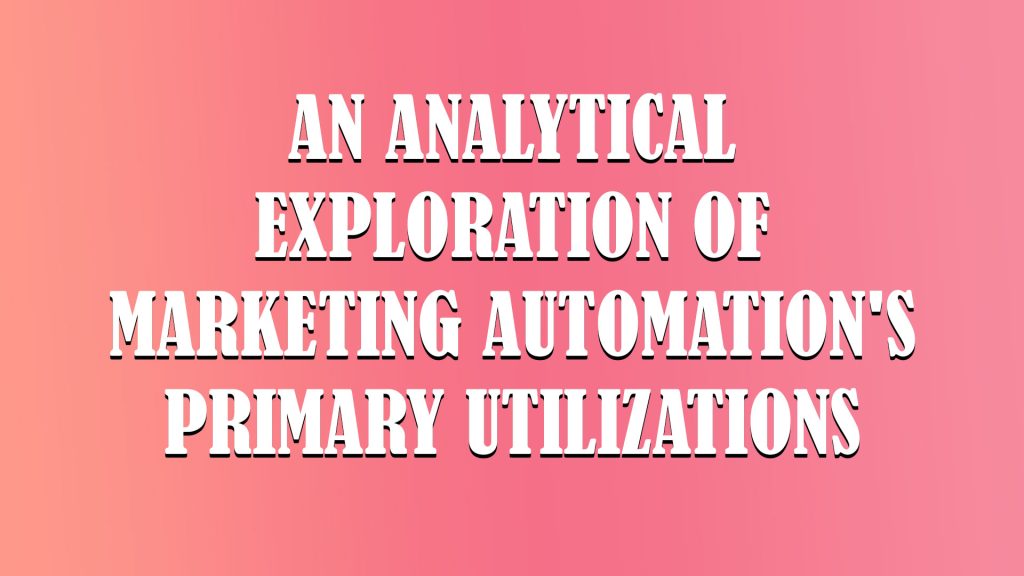Introduction:
In the digital age, marketing automation has become an important tool that enables companies to efficiently scale their automation activities. Using cutting-edge technology, our marketing automation platform offers a comprehensive suite of features for automating and streamlining a variety of marketing processes. The purpose of this article is to explain the main objectives of marketing automation primarily used for, examine its technical underpinnings, and show how marketing automation can improve marketing operations.
What is marketing automation primarily used for?
Lead Management:
One of the core applications of marketing automation is lead management. By employing automated workflows, businesses can efficiently capture, track, and nurture leads throughout their buyer journey. Marketing automation platforms facilitate lead scoring, enabling businesses to prioritize leads based on their engagement and interactions with marketing content. Lead nurturing campaigns, personalized based on user behavior, allow businesses to deliver targeted and relevant content to prospects, increasing the likelihood of conversion.
Email Marketing:
Marketing automation platforms serve as a robust foundation for email marketing campaigns. Technical capabilities such as drip campaigns, triggered emails, and dynamic content personalization empower marketers to send timely and relevant messages to segmented audiences. A/B testing features enable data-driven decision-making, optimizing email content and design for improved open rates, click-through rates, and conversions.
Customer Segmentation:
Marketing automation thrives on data analysis and segmentation capabilities. Through sophisticated algorithms and machine learning, marketing automation platforms segment audiences based on demographics, behaviors, and preferences. This technical prowess allows businesses to tailor marketing messages precisely, ensuring that the right message reaches the right audience at the right time.
Behavior Tracking and Personalization:
By tracking user behavior across various touchpoints, marketing automation platforms compile comprehensive user profiles. This analytical aspect enables businesses to deliver highly personalized marketing experiences. Tailored content, product recommendations, and dynamic website elements enhance user engagement, fostering a sense of individualized attention for each customer.
Multi-Channel Marketing:
The technical framework of automation facilitates seamless multi-channel marketing. Through integration with social media, SMS, push notifications, and other channels, businesses can orchestrate cohesive campaigns across diverse platforms. The ability to automate cross-channel interactions ensures consistent messaging and enhances the overall customer experience.
Analytics and Reporting:
It’s technical prowess extends to data analysis and reporting. Robust analytics dashboards provide insights into campaign performance, customer behavior, and ROI. Businesses can leverage these metrics to refine marketing strategies continually, identifying areas of improvement and optimizing marketing efforts.
Customer Retention and Loyalty:
Beyond lead acquisition, automation plays a pivotal role in customer retention and loyalty programs. Technical functionalities like automated loyalty rewards, personalized offers, and re-engagement campaigns strengthen the customer-business relationship, fostering long-term loyalty.
Sales Enablement:
Automation not only benefits the marketing team but also plays a crucial role in sales enablement. Seamless integration with Customer Relationship Management (CRM) systems provides sales teams with comprehensive lead data, empowering them to engage prospects with relevant and timely information. If you are a beginner and just start a career in Marketing Automation (CRM), must enroll in this course HubSpot (CRM)- For Beginners From Basic to Advance
Conclusion:
Marketing automation, driven by advanced technical capabilities, revolutionizes modern practices. Its primary utilizations encompass lead management, email marketing, customer segmentation, behavior tracking, multi-channel marketing, analytics, customer retention, and sales enablement. By automating repetitive tasks and leveraging data-driven insights, marketing automation empowers businesses to optimize their marketing strategies, enhance customer experiences, and drive sustainable growth in today’s competitive landscape.
ALSO READ: Which Industries Use Marketing Automation? Exploring Automation in Various Sectors

